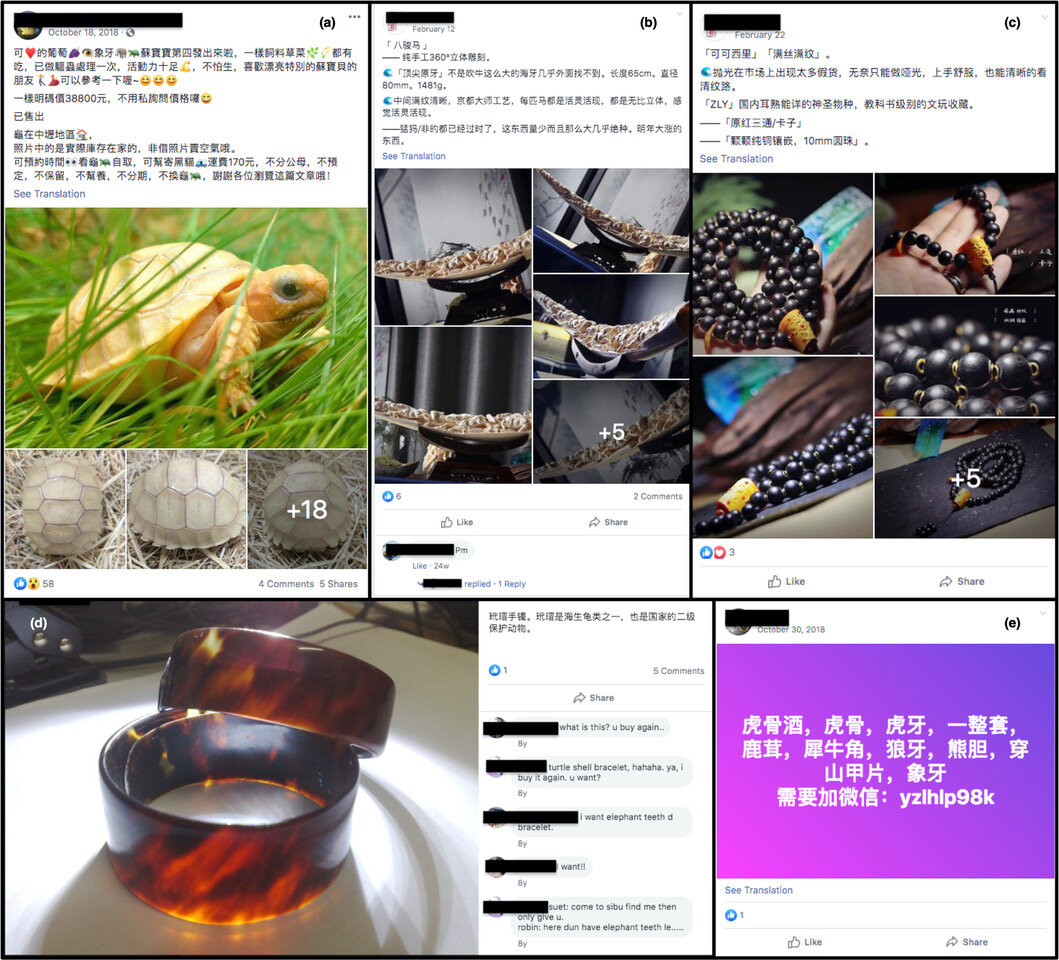Wildlife in Peril: Animals are Traded, Tortured on Social Media
The Problem
With the planet reeling from a mass extinction crisis, the world’s biggest markets for illegal wildlife products and exotic pets are located on social media platforms like Facebook, Instagram and China’s WeChat.
In just a few clicks, it’s easy to find pages, groups and postings selling big cats, reptiles, birds, primates, and insects for the exotic pet trade, as well as wildlife products made from endangered species such as elephant ivory, rhino horn, pangolin scales and marine turtle shells.
Social media offers wildlife criminals and unscrupulous traders with an unprecedented global customer reach, as well as anonymity and payment systems.
This vast, unregulated trade in live animals and their parts exacerbates risk of another animal-human spillover event, such as the ones that caused Ebola, HIV and the COVID-19 pandemic.
Several social media platforms, including Facebook, are also home to private groups where animal torture content is traded and sold, including videos and live events featuring things like dog fighting and baby animals being clubbed to death.
Experts agree that monitoring online animal markets offers significant opportunities to interdict criminals and save animals.
The Specifics
Because of the wide range of wildlife species being traded, it’s hard to determine the full scale of online markets where animals and their parts are traded. Taken together, multiple studies in recent years have logged millions of social media posts, groups, and pages where wildlife goods are illegally sold.
A 2020 ACCO study found that most wildlife trading on Facebook takes place in the open; groups and pages that operate as markets for live animals and wildlife products don’t bother to disguise their purpose, meaning the firm is failing to impose its own community standards.
The 2020 study also found that 58% of the Facebook pages or groups had the term “sale,” “sell” or “buy” in their title, meaning the firm could utilize simple “if” code to identify and block these pages and groups. Many images showed animals in clear signs of distress.
The World Parrot Trust, an ACCO member, reports that online platforms have enabled traders to procure birds and other animals more efficiently and also expand their networks and consumer base, contributing to the collapse of key African parrot populations.
A 2017 investigation by CINTOC, an ACCO member, identified multiple ivory traffickers operating internationally, connecting to and communicating with customers entirely through social media.
Former Facebook moderators who joined ACCO in filing a whistleblowers complaint to the U.S. government there are hundreds of private and secret groups where animal torture video and images are sold and traded.
Multiple ACCO members have developed cutting-edge machine-learning tools able to single out wildlife traffickers operating on social media, but firms have been slow to adopt such available technology.
Key Facts and Figures
Social media use has grown rapidly in Asia, a huge market for illegal wildlife. China’s WeChat has 1.2B users, or more than 85% of China’s smartphone users. Facebook, which is WeChat's prime competitor in the region, has 400 million users across Asia, making it Facebook's largest market.
In a 2016 investigation, the Wildlife Justice Commission, an ACCO member, identified 51 Vietnamese traffickers who trafficked more than $53 million dollars-worth of ivory, rhino horn and tiger parts. Up to a third of this trafficking took place online, including on Facebook and other platforms.
The Project to End Great Ape Slavery, an ACCO member, estimates more than half the global trade in Apes occurs on social media, with Facebook and Instagram accounts selling young apes to collectors mainly located in the Gulf.
The Cheetah Conservation Fund, an ACCO member, reports that upwards of 70% of the illegal trade in cheetahs online takes place on Instagram. An ACCO investigator identified more than 200 Instagram accounts moving roughly 200 live cheetahs a year.
ACCO member Lady Freethinker is tracking some 50 Facebook Groups with a combined membership of hundreds of thousands of members that post dog-fighting content, including live-streamed fights and fighting dogs for sale.
How It Works
Wildlife traffickers post an image of themselves, or an item for sale.
Interested parties “like” the image or DM the trafficker
The trafficker may invite the user to a private or secret group, or encrypted chat.
Often the trades take place openly, with no obfuscation.
Payments may occur on the platform, or using another system. The product is delivered offline.
If the product being sold is an image or video, such as animal torture content, every step of the criminal supply chain occurs on social media.
Current Law
Section 230 of the 1996 Communications Decency Act grants expansive immunity to any provider of an “interactive computer service” for user-generated content, even if a tech firm knows it’s hosting illicit content. Trading endangered wildlife and animal torture violates various U.S. laws and global treaties.
Proposed Legal Reform
ACCO seeks legal reform to make the tech industry liable for monitoring their platforms for illegal activity, including wildlife crime. ACCO seeks regulation requiring platforms to provide criminal evidence to the relevant law enforcement body. Without such reforms, iconic species are threatened with extinction and the world risks another pandemic.
ACCO’s Mission
The Alliance to Counter Crime Online is a team of security experts, academics, NGOs and citizen investigators that have come together to push serious organized crime and terror activity off Internet platforms.












